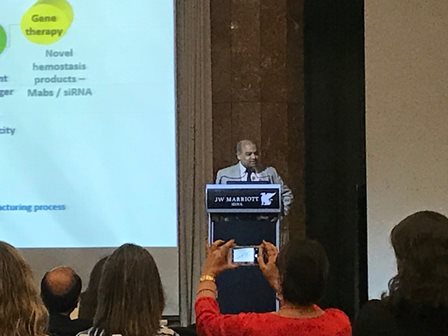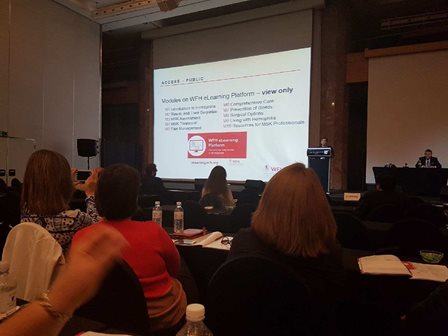JOHANNA NEWSOM
Johanna Newsom is Senior Physiotherapist at Children’s Hospital at Westmead, Sydney
Photo right: Australian physiotherapists at the MSK Meeting
The 15th WFH International Musculoskeletal Congress was held in Seoul, Republic of Korea 5-7 May 2017. Over 250 delegates attended, representing more than 40 countries on all 6 inhabited continents. All delegates had a particular interest in the management of joint and muscle complications as a result of haemophilia, and with the Congress proudly and deliberating promoting a “musculoskeletal-family feel”, input from every delegate was encouraged and welcomed, which led to some interesting and robust discussions!
The JW Marriott Hotel in Seoul was the venue for this year’s Congress. Located on the southern side of the Han River, in an area developed primarily for the 1988 Summer Olympic Games, we found ourselves in a region known as Gangnam – perhaps best known by the delegates because of the iconic 2012 K-Pop hit “Gangnam Style” by Korean artist Psy. And this song became the unofficial anthem of the Congress, getting some good air time at the official conference dinner.
Opening with a session titled “Driving ahead with one eye on the rear view mirror”, some of the long-standing members of the World Federation of Hemophilia (WFH) Musculoskeletal Committee reflected on its humble beginnings in 1977 when a small group of six interested clinicians met in the lounge room of an inspired orthopaedic surgeon. This led to official recognition by the WFH in 1984, and the commencement of regular musculoskeletal congresses in the 1990s. This session rounded out with presentations predicting the future of both physiotherapy and orthopaedic surgery in haemophilia – fortunately, both sounded exciting and promising. These gave a good teaser for the highlight sessions to come – the effects (and costs) of exercise and training, debate around definitions and management of synovitis, and an amazing opportunity to “talk to the experts” with a consultation corner discussing complex cases and issues that are too often ignored.

It is well-established now that being as fit and active as possible is ideal for people with haemophilia – most people won’t complete a visit to their HTC without being asked about their physical activity and ability to participate. This is commonly followed up with advice from the team, and even specific exercises and activities often recommended by the physio. Appropriate exercises and activities can be one of the most effective (and cheapest!) methods of managing haemophilia and minimising bleeds, pain and other problems.
In this session, we heard about how to plan an exercise program safely, including the vital step of having a physio or other expert globally evaluate the entire musculoskeletal system (screening for previous injuries, damage and other issues with joints, or muscle weakness) before commencing a new activity. We discussed safe ways to progress activities and train harder to get fitter and stronger, and talked about how the muscles, joints and bones respond to training. We also heard about some scenarios where poor training technique lead to injuries and problems – a good reminder to us all to take it easy and listen to our bodies (and the haemophilia team) when we decide to hit the gym!
Synovitis is a term commonly heard in haemophilia circles. Defined as an inflammation of the synovium, or joint lining, it is known to occur as a result of bleeding into joints. With only one or two bleeds, the hope is that this synovitis resolves, but with more and more bleeds into the same joint, the synovitis becomes chronic and can pose a much bigger challenge to treat and manage. Chronic synovitis is thought to be the starting point for serious degeneration and damage in a joint.
There was a lot of debate around how to decide when synovitis becomes chronic synovitis, and what assessments we can use to help make that distinction – the Haemophilia Joint Health Score, a comprehensive clinical assessment, and imaging (like X-rays or MRIs) all seem to have their part to play… the take home message is that regular check-ups will help to identify any early changes in the joint lining, and the information gained from these assessments will help to tailor an individual treatment program for anyone who appears to have inflammation in their joints. So it is important to keep those clinic appointments!

Several speakers from different countries presented cases to help us all learn from each other in an incredibly thought-provoking session. There was lively discussion around various surgical approaches, timing and style of physiotherapy and rehabilitation, and the need to take into account how easy it is to access factor.
One of the most memorable quotes of the conference came from a UK orthopaedic surgeon who was talking about questions he had learnt to ask over years of treating haemophilia patients. Specifically discussing elbow issues and loss of movement and flexibility in this joint, he talked about asking patients “Can you reach both ends of your alimentary tract? That is, can you put food in, and deal with the other end when it comes out?”. In a nutshell, this simple question highlighted the functional impact of joint bleeds and damage, and how patients and clinicians need to be open and honest about the issues they are facing, and help each other to set realistic goals and look for solutions together.
Seoul was a wonderful choice of location, and the Congress had plenty of South Korean influence throughout – some amazing catering, fascinating insights into the haemophilia treatment centres in Seoul, and a cultural show at the Congress dinner that had us all participating and clapping along. The Musculoskeletal Congress is an invaluable addition to the WFH calendar for clinicians with an interest in the impact of haemophilia on joint and muscle health, and the intimate nature of the Congress provides ample opportunity to meet people from other countries and discuss the management practices being used around the world. There is plenty of interest and exciting research coming up in this area, which can only be to the benefit of all people involved in the world of haemophilia – and it is so exciting that Australian clinicians have the chance to attend and learn from these events, and that HFA supports us in sharing that knowledge!
Johanna received partial funding from Pfizer and Novo Nordisk to attend the 2017 WFH International Musculoskeletal Congress.
Haemophilia Foundation Australia acknowledges the Traditional Owners and Custodians of Country throughout Australia, the land, waters and community where we walk, live, meet and work. We pay our respects to Elders past and present and extend that respect to all Aboriginal and Torres Strait Islander peoples.
Sign up for the latest news, events and our free National Haemophilia magazine